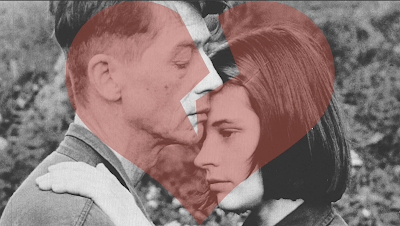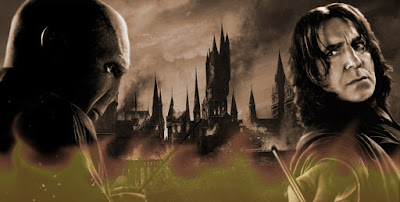Book Two: Chapters 3-6
"Under the window somebody was singing...Whenever her mouth was not corked with clothes pegs she was singing in a powerful contralto: 'It was only an' opeless fancy, It passed like an Ipril dye, But a look an' a word an' the dreams they stirred They 'ave stolen my 'eart awye!'... But the woman sang so tunefully as to turn the dreadful rubbish into an almost pleasant sound." (114)
The women's song was a sense of hope for Winston. He's tired of the Party, he wants to overthrow them. He's hoping for this change and he hopes it will happen soon. He focuses on the song and he's hopeful that one day the Party will be overthrown. He wants this all to end.
 This song reminded me of the song in the musical Les Miserables "Do You Hear the People Sing?". This song is sung in the song twice throughout the musical, making it a very powerful song in the movie to invoke the act of rebellion in the people. The song is sung by the cast to protest against the injustices they are facing. This song is also a way of rebellion against the French Government.
This song reminded me of the song in the musical Les Miserables "Do You Hear the People Sing?". This song is sung in the song twice throughout the musical, making it a very powerful song in the movie to invoke the act of rebellion in the people. The song is sung by the cast to protest against the injustices they are facing. This song is also a way of rebellion against the French Government.
I thought this song related to the song in the book because both songs invoke a sense of rebellion and a sense of hope to the people in the situations. Although the song that the women is singing isn't necessarily saying to rebel, Winston interprets that a change will be made in the future. Winston wants to rebel but knows he can't do it alone, so I could see him singing "Do You Hear the People Sing?" specifically the verse "Then join in the fight, that will give you the right to be free!" because in a way, that's what he ultimately wants to do.
The women's song was a sense of hope for Winston. He's tired of the Party, he wants to overthrow them. He's hoping for this change and he hopes it will happen soon. He focuses on the song and he's hopeful that one day the Party will be overthrown. He wants this all to end.
 This song reminded me of the song in the musical Les Miserables "Do You Hear the People Sing?". This song is sung in the song twice throughout the musical, making it a very powerful song in the movie to invoke the act of rebellion in the people. The song is sung by the cast to protest against the injustices they are facing. This song is also a way of rebellion against the French Government.
This song reminded me of the song in the musical Les Miserables "Do You Hear the People Sing?". This song is sung in the song twice throughout the musical, making it a very powerful song in the movie to invoke the act of rebellion in the people. The song is sung by the cast to protest against the injustices they are facing. This song is also a way of rebellion against the French Government.I thought this song related to the song in the book because both songs invoke a sense of rebellion and a sense of hope to the people in the situations. Although the song that the women is singing isn't necessarily saying to rebel, Winston interprets that a change will be made in the future. Winston wants to rebel but knows he can't do it alone, so I could see him singing "Do You Hear the People Sing?" specifically the verse "Then join in the fight, that will give you the right to be free!" because in a way, that's what he ultimately wants to do.



I really like the way you interpret this because it fits very well with what we already know. By being able to see that Winston is most likely seeing this as a sign of hope makes sense because he mentions how it is so uncommon to actually hear people sing that it would give him some sort of sign of hope because he truly wants things to be different that what they are and the song is giving him some sort of hope in an obscure way. Also I really love how you are able to draw connections to Les Miserables and the song the sing because it fits in very well into this because you can see the similarities, it was a great choice to add in here. This was such a great post!!
ReplyDeleteOkay, first off. YES LES MIS REFERENCE! It fits really well, in this sense, a song that is interpreted as a call for change, a call for hope, and in a musical version of 1984, Winston would totally sing "Do You Hear the People Sing", with a few altered words, of course. I love the picture you chose, and the ties in to a great musical.
ReplyDeleteThe Les Mis song invokes a feeling of being fed up with the system as it is, and attempting to rebel and change things for the better, and Winston thinks of it quite similarly...
I could totally see Emanuel Goldstein as Enjolras, both the leaders of a revolution, both from rich and high up places who attempted to create a change, and both ultimately unsuccessful.
The song reference was a great add to your blog. It helped me really connect to the quite. I can really see the similarities between them. I can understand that he may be seeing this as a sign of hope because he talks about how it is rare to hear people singing. He wants a change and the song is hope for it. The picture is also nice because I can see how it all ties in together with Winston being tired of the system the Party has installed.
ReplyDeleteThis was a cool quote that you chose and the song you referenced was wicked as well. Winston is tired of all the nonsense that Big Brother has been causing, and the song is like another light for him. He heard hope within the song. Your reference to Les Miserables was awesome. The song you chose matched with the scene quite nicely. The rebellious tune to both of the songs can be overlapped and represent the same meaning.
ReplyDeleteReally nice quote and analysis. I loved the thought of the song being a sign of hope to Winston. I personally would've talked a little more about how the woman's voice, her strong vibrato made her song even more powerful and filled with even more hope. As a music nerd analyzing her voice would've made an even stronger analysis. But other than that very nice well done. P.s. I'll watch the movie I remember you teying to show it to me nice it seem nice from the very beginning. :)
ReplyDeleteHello there!
ReplyDeleteI really liked your post. I thought the comparisons between the song in 1984 and Les Miserables was great. They both have a sense of rebellion in their own ways and it really showcased what Winston was feeling when he heard this.
Keep up the great work :)
The way you described her voice being Winston's hope was really interesting to me. His eager desire so not follow the laws forced upon him is a really cool trait about him. He does what so many are afraid to do. Your comparison of the songs was really interesting too. Good job girl :)
ReplyDeleteLove the song mention! I think you could've gone further into the woman and her voice as it furthered Winston's feelings. The song really sang of hope to Winston and I like how you analyzed what type of song he heard it as. Winston heard what he wanted to hear and it inspired him.
ReplyDeleteHi Lynda! First off I really like how well you interpreted this quote, and how much you went into depth about it. I 100% agree with you, especially when you talked about how the song reminded you of Les Miserables, and how this song related to the song in the book because both songs invoke a sense of rebellion and a sense of hope to the people in the situations. Great work!
ReplyDelete